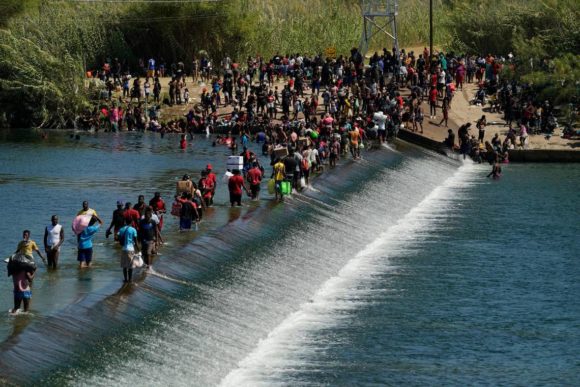My family celebrated Passover this past weekend. It is called the “Holiday of Questions” for many reasons, but especially to pull children into the story of the Israelites leaving Egypt, hoping to reach the Promised Land despite all obstacles.
My 6-year-old grandson is an inquisitive boy, and we enticed him to join the storytelling by promising him a prize for each good question he asked or answered. (He was the only youngster present).
The questions quickly gravitated to the Israelites being slaves in Egypt. He wanted a smart 6-year-old’s definition of slavery and slave masters and why the slaves desperately wanted to leave to get freedom.
I wanted to educate him this Passover because I think he has no understanding about what bondage is, yet a drama similar to the Passover story continues to be played out all over the world and very dramatically here in Texas, Arizona, and California, as today’s equivalent of slaves pour into the United States.
The Rio Grande river near Del Rio, Texas, could even be compared to the “Red Sea” or the “Sea of Reeds,” which the Israelites waded across to reach the promised land of Israel. Instead of Egyptians chasing them as in Cecil B Demille’s The Ten Commandments, they walk into a new country, facing armed officers, both with fear and hope.
“Give me your tired, your poor, your huddled masses yearning to be free,” is in the poem etched on the back of the Statue of Liberty. Could any verse be more representative of the slaves from communist Cuba and Venezuela wading across the Rio Grande, as well as the brutalized people from Honduras and El Salvador escaping tyranny and drug lords. And now refugees from Ukraine are congregating in Tijuana waiting to enter the country they pray will give them the chance to live in relative peace and prosperity.
I see this huge immigration to America as an economic opportunity for our country to restock with similar kinds of people as my grandparents and great-grandparents when they were crammed into the steerage of boats after walking to the ports of Russia and Lithuania in the early decades of the 1900s. Some went to Israel and South Africa, but most came to New York and Chicago because they had family who could give them a bed until they got a job. My great uncle Simon Pinkert met his wife, Ida Graff, in one of those Chicago houses. He was a baker who worked at night. She worked in the big house’s kitchen. The story goes that they both slept in the same bed, he in the morning and she at night, and then they met on the Sabbath. They had 12 kids, eleven survived. All were successful.
My wife’s maternal grandfather came on a boat at 16. He traveled the country as a peddler for years, and then started a clothing store in Raleigh, North Carolina.
I know many people see the undocumented immigration from Mexico as scary. They think the dirty and wretched folks wading across the border without papers pose a threat to this country.
I see it differently. Our legal immigration system is a mess. We are supposed to have a lottery to admit 55,000 people a year. Last year we documented half of that number because the bureaucracy was missing in action, supposedly because of COVID-19. Many people entered the country on tourist visas and never left, hoping to find a legal way to stay or otherwise work the system to keep their ticket to hope.
Many politicians and media hacks play immigration fear for personal gain by making illegal immigration seem to be our downfall. I see it as our future. The workforce has lost an estimated 3.5 million people in the last few years. Many people who could work have chosen for some reason not to work. These are not prisoners. They are dropouts for many reasons such as childcare, government welfare programs, laziness, depression, opioid and marijuana addiction, and many other causes. America desperately needs a shot in the arm to our workforce. Most of the waders across the Rio Grande are young and have many dreams. It wasn’t easy to get here.
I am grateful we have our “Sea of Reeds” to give a chance to millions of people “yearning to breathe free.” Some will fail. Some will eventually go back to their old homes. But I believe most of them will contribute to the America my 6-year-old grandson and my newborn grandson will share with them.
Question: Should we send undocumented immigrants back?

